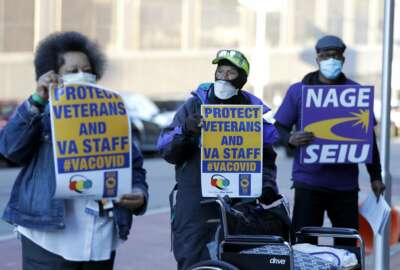

Veterans who received emergency medical treatment at non-VA facilities recently achieved a victory in the U.S. Court of Appeals for Veterans Claims.
Best listening experience is on Chrome, Firefox or Safari. Subscribe to Federal Drive’s daily audio interviews on Apple Podcasts or PodcastOne.
Veterans who received emergency medical treatment at non-VA facilities recently achieved a victory in the U.S. Court of Appeals for Veterans Claims. Now the VA last week started sending corrective notices to a million vets that weren’t reimbursed. Joining Federal Drive with Tom Temin with details, the executive director of the National Veterans Legal Services Program, Bart Stichman.
Interview transcript:
Tom Temin: Bart, good to have you back.
Bart Stichman: Thank you, Tom. Good to be here.
Tom Temin: Now, you had an earlier ruling that looked like the Veterans Affairs would eventually have to do this, tell us the chronology and what is happening right now.
Bart Stichman: Well, what happened after we won the court ruling in September was the VA asked for a moratorium on what they were required to do until their appeal that they contemplate to the higher court is decided which would delay things by a year and a half, two years. And the court rejected that argument and ordered the VA to start sending notices to correct misinformation the VA gave two reimbursement claimants in over a million cases. So the VA started that on Monday, April 13. And it’s going to take them about 100 days, they say.
Tom Temin: They’re sending notices telling people that they had rejected their claims earlier that now the claims are accepted and will be paid, in other words?
Bart Stichman: No, there different types. There’s a group of 72,000 that fit your description. They were wrongly denied, because they had private insurance and the VA thought they didn’t have to reimburse them for deductibles or coinsurance. Those were wrongly decided and the VA is going to redecide them. The other over 900,000 people are going to get a corrective notice to correct misinformation the VA gave about the criteria, making it seem like the veterans couldn’t win, and so they would potentially not pursue their claims. So The information they gave was before a decision was made. And in order to correct that the VA is sending them a new notice, and giving them a new opportunity to pursue their claims.
Tom Temin: And what is the practical effect of this, that more veterans you feel will feel the freedom to go seek that care or if they have to have emergency care, they can get it anywhere and know that they’re covered because they would be entitled to VA benefits?
Bart Stichman: Right? The position of the VA could lead veterans to not going to a non VA facility that’s near their home, that they need to get to for a an emergency, and travel an hour two or three to the VA facility because they don’t want to incur expenses. And if they do that they’re risking their lives, because these are by definition emergencies. And so they shouldn’t be encouraged to do that. And so the effect of the ruling will allow veterans to do what is most practical and reasonable when you have an emergency like a heart attack or you’re hitting an automobile accident and suffer severe injuries, you should immediately go to the nearest hospital.
Tom Temin: And I guess my question is, if the veterans were legally entitled to this reimbursement, there is a statute that says so, why do you think VA was trying to argue otherwise?
Bart Stichman: They don’t seem to like this benefit. They were required by Congress to reimburse people who had partial insurance for the remainder that the veteran was required to pay to the medical providers. And so they’ve been fighting this statute which was passed in 2010, ever since 2010. We won once in 2016. That said they had to pay them even if they had some private insurance covering part of the payment. And then they promulgated a regulation, which in effect was inconsistent with the court ruling. And so this is the second time we went back to the court that resulted in the victory last September, and the VA is threatened to appeal. So this is not their favorite benefit. They just don’t want to have to pay veterans who have emergencies with getting VA care all along, but they can’t get reasonably that the VA facility because it’s an emergency.
Tom Temin: And what does VA offer these same people as an alternative? What should they do in terms of what VA is telling them?
Bart Stichman: The VA doesn’t answer that question that you’ve asked. They just say we read the statute to allow us to do this, even though the courts have told them no. And we’re going to appeal because we think our interpretation of the statute that we don’t have to reimburse them for what’s uncovered by the private insurance is the correct interpretation the law, they don’t say what veterans should do in that situation.
Tom Temin: And do you have a sense of how many of the people that might be getting these notices, the million, are in possession of insurance that would cover at least part of the emergency expenses and how many might be totally reliant on VA.
Bart Stichman: They’re paying the ones that have no private insurance. That’s never been an issue. These million people that we’re talking about all had partial insurance, so they all fit in that group. And they’re all potentially eligible. I can’t tell you how many of them will win because there are a few hoops these veterans have to jump through. For example, is it a real emergency, the VA could potentially deny it, because it’s not an emergency according to the VA or they filed too late, something like that. But they all should be able to pursue their claims after the corrective notices are sent out knowing what the rules of the game are.
Tom Temin: And at this point you don’t know for certain whether VA will appeal. They’ve just signaled that they might.
Bart Stichman: It’s their intention to appeal, they say, but they have to get approval to do so the Solicitor General of the United States has to approve any appeal to a higher court and they’ve not done so as yet as far as I know,
Tom Temin: And this program is prepared to go as many legal steps as required?
Bart Stichman: Absolutely. We’re prepared to oppose them to say appeal, and we will get hope to get a lot of groups to support us in opposing their appeal.
Tom Temin: Bart Stutzman is executive director of the National Veterans Legal Services Program. Thanks for the update.
Bart Stichman: Thank you, Tom.
Copyright © 2024 Federal News Network. All rights reserved. This website is not intended for users located within the European Economic Area.
Tom Temin is host of the Federal Drive and has been providing insight on federal technology and management issues for more than 30 years.
Follow @tteminWFED


